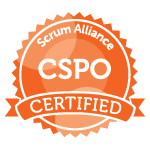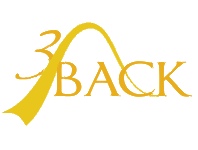GET CERTIFIED
CERTIFIED SCRUM PRODUCT OWNER TRAINING

PREREQUISITES: Basic knowledge or experience with Scrum or Agile
OUTCOME: CSPO Certification and 14 PDUs; 14 SEUs
DURATION: 2 Days
REQUIRED READING: Scrum 101
3Back’s Certified Scrum Product Owner training provides a comprehensive look at Product Ownership in the Scrum environment. Learn the mechanics of routine activities, such as managing the Backlog, as well as enterprise-level concerns, such as strategic visioning with Scrum, managing multiple projects per Team, and managing single projects that span multiple Teams. Through a combination of lectures, activities, and simulation, students will learn the fundamentals of leading an agile project.
Our CSM and CSPO classes assume the student has a basic knowledge of Scrum. If you are concerned, view the Scrum Alliance Foundations videos here.
We use guided exercises in short 15-minute or less periods where students interact after working with explicit and clear guidance, followed quickly by discussion with your instructor. We also use exercises and questions to help students grasp the learning objectives and outcomes required for your foundational course.
THE 3BACK DIFFERENCE
WHAT YOU GET
We’ll cover your Scrum Alliance membership dues and certification for the first 2 years.
FEEDBACK IS PARAMOUNT
SEE WHAT OUR STUDENTS ARE SAYING
READ 3373 MORE REVIEWS ON SCRUM TRAINING REVIEW
CERTIFIED SCRUM PRODUCT OWNER TRAINING
AGENDA
The 2-day Certified Scrum Product Owner class is an intensive interactive session designed to leverage the diverse background of the participants through facilitated discussion, activities and simulation. The following topics will be covered:
- Values and Principles
- The Scrum Framework
- Modern Scrum vs. Original Scrum
- Roles, Artifacts and Ceremonies
- Scrum-Appropriate Projects
TRAININGS AVAILABLE NATIONWIDE
FIND A COURSE NEAR YOU
ADDITIONAL
DETAILS

So you want to learn about Agile Project Management. But is training really worth it? Isn’t ‘Product Owner’ just the Scrum term for ‘Product Manager’? What can training provide that reading a few books can’t? Can this training help solve the Product Owner Dilemma? Remember: A Good ScrumMaster isn’t Everything Although the emphasized ScrumMaster role is key to successful Scrum application, the role of Product Owner is no less important, though it may be less talked about. Learn how to partner with your ScrumMaster to make an effective Scrum force. Scrum Product Owner training is especially appropriate for anyone in the corporate structure dealing with rapidly changing demands and decision-making responsibilities.
CERTIFIED SCRUM PRODUCT OWNER TRAINING
So you want to learn Scrum. But is training really worth it?
What can training give you that reading a few books can’t?
TIME = MONEY
Transforming your team or organization to a new methodology is a big undertaking. Organized training will give you the kickstart you need and save you valuable time otherwise wasted on costly trial and error.
INCREASED RETENTION
Studies show that when learners “do and say,” they experience an increase of knowledge retention up to 80% over reading alone.
BUILD SKILL, NOT JUST KNOWLEDGE
Books and blogs are good knowledge resources. Skill, however, is acquired by doing. There is simply no replacement for the skill building that occurs with hands-on activities and real-life simulations.

There is no right or wrong person to attend this training. In fact, the most successful agile adoptions have included training for everyone, right down to Finance and Sales staff. Scrum training is especially appropriate for anyone in the corporate structure dealing with rapidly changing demands. In a traditional organization, these roles might include:
Developers
Program Managers
Designers
Stakeholders
Testers
CXOs
Technical Writers
Analysts
Directors
Architects
SMEs
QA Staff
Project Managers
Coders
Product Managers
Engineers
WHAT INDUSTRIES
USE SCRUM?

The most popular use of Scrum is for software development in a wide variety of industries, including financial services, insurance, education, information technology, government programs and supply chain management. But Scrum goes beyond software development! We’ve known organizations and individuals who have used Scrum for graphic design, wedding planning, data warehousing, consulting, classroom projects, household management, auto salvage yards and much more. Scrum is appropriate for almost any complex project with rapidly changing or emergent requirements, regardless of the industry.

